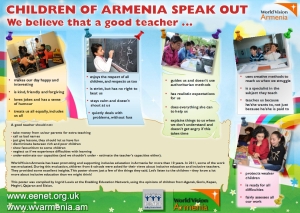Back in 2010 I was working with World Vision Armenia as an Education Expert and was managing two big projects on supporting inclusive education in Armenia. The first project was receiving funds through World Vision UK and DFID. It aimed to improve inclusive teaching practices in schools, strengthening the teachers’ capacity to adapt the curricula to the needs of children with special educational needs. The second project was funded through USAID, and focused on strengthening the capacity of disabled people’s organisations (DPOs) and non-governmental organisations (NGOs) to promote public understanding of disability and acceptance of inclusive education.
According to the logframe of my first project we needed to invite an international consultant to evaluate our efforts and provide recommendations on improvements and following steps. I am so thankful to WVUK for recommending Ingrid Lewis from EENET! Ten days we spent travelling throughout the project sites. Conducting meetings and round table discussions at schools, having lesson observations and informal communications with students helped me to understand the context well, my partners’ perception and understanding of both the project’s goals and inclusive education concept. It revealed our strengths and weaknesses alike and helped me view inclusive education from a totally different angle: it is not education for children with special educational needs, it is enabled education for ALL students, so that every child can gain from the hours spent at school in proportion to his/her abilities and capacities.
This consultancy supported me to recognize good teachers in our communities and develop role models for others through the first video manual for teachers in Armenia. It also helped me learn about and understand the Index for Inclusion and discover the global EENET community!
Here’s a poster featuring the opinions of children in inclusive schools in Armenia
Two years later I was honored to enter the EENET family as a ‘Client Representative Director’ – a volunteering job, which gave me an opportunity to know in person other team members and experienced experts in the inclusive education field who are all very open and dedicated people ready to share their knowledge easily.
My role is to view EENET’s activities from the clients’ point of view (this is primarily about the consultancy clients, but I’m also interested to see EENET’s activities from the perspective of general network users). My role is to provide suggestions about what types of ‘services’ and resources the clients/users may request; in what format the information should be presented, etc.
I’ve always felt that EENET’s website provides wide access to resources on inclusive education practices; it is very supportive for teachers, offering different articles and methodologies for managing inclusive classes. It is accessible for different users (I find the on-line translator helps non-English speakers understand the core messages in all articles). I believe that this new blogging opportunity will increase EENET’s communication with a wider range of clients/users/partners.
I would love to read your views and suggestions about what you would like to see and or obtain through EENET’s website. You can leave comments here, or email me via consultancy@eenet.org.uk
Hasmik Ghukasyan
EENET’s Client Representative Director

